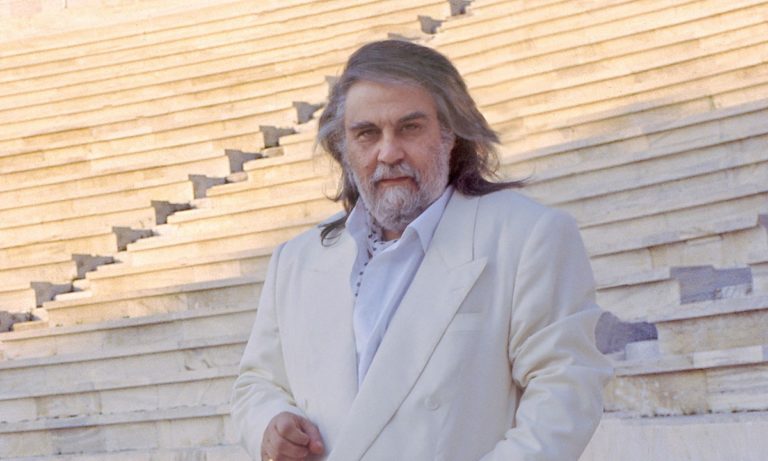Oscar-winning composer Vangelis passes away

Πηγή Φωτογραφίας: Αρχείου
Vangelis, the Greek composer whose rousing electronic theme music for the Oscar-winning “Chariots of Fire” was one of the best-known film scores of the 1980s, has died at the age of 79, the Athens News Agency said on Thursday.
Citing an announcement from his lawyers’ office, ANA said Vangelis died late on Tuesday, without giving a cause of death.
Greek media reported that Vangelis died in a French hospital late Tuesday.
Greek Prime Minister Kyriakos Mitsotakis and other government officials expressed their condolences Thursday. “Vangelis Papathanassiou is no longer among us,” Mitsotakis tweeted.
Born Evangelos Odysseas Papathanassiou in 1943 in Volos, the young Vangelis developed an early interest in music and experiments with sounds produced by banging pots and pans or fixing nails, glasses and other objects to the strings of his parents’ piano.
He absorbed the tones of Greek folk songs and Orthodox Christian choral music, but he had no formal musical training, which he later said had helped save his sense of creativity.
After a start with local rock bands, Vangelis left for Paris at the age of 25, joining an exodus of young artists following a 1967 coup which installed a military junta in Greece.
As he found his feet away from home, he was attracted by the then-new field of electronic synthesizers which allowed him to create the lush melodic colors that became his trademark sound.
Despite enjoying success in the European “prog rock” scene of the early 1970s, he was uncomfortable with the expectations on a commercial performing artist and largely retreated to the recording studio he created for himself in London.
It was there that he wrote the score for “Chariots of Fire,” the story of the triumph of a group of British runners at the 1924 Olympic Games.
Unashamedly non-contemporary, its pulsating synthesizer beats and soaring melody made the slow-motion opening sequence of a group of athletes running along a beach a model for the way the cinema portrayed sport.
Vangelis once said the score, which earned him an Academy Award and topped the charts for weeks, was in part a tribute to his father, who had been a keen amateur runner. But he was also slightly dismissive of the enormous popularity it enjoyed.

“It’s only another piece of music,” he told an interviewer.
The signature piece is one of the hardest-to-forget movie tunes worldwide – and has also served as the musical background to endless slow-motion parodies.
The success of “Chariots of Fire” overshadowed his other scores but he wrote the music for a number of major films including “Missing,” directed by his compatriot Costa-Gavras, and Ridley Scott’s futuristic thriller “Blade Runner.”
He was a prolific composer over many decades, his work ranging from advertising music and film scores to elaborate symphonic-style compositions and “Jon and Vangelis,” his duo with Jon Anderson, lead singer of the prog rock group Yes.
He refused many other offers for film scores, saying in an interview: “Half of the films I see don’t need music. It sounds like something stuffed in.”
Vangelis was wary of how record companies handled commercial success. With success, he said, “you find yourself stuck and obliged to repeat yourself and your previous success.”
His interest in science — including the physics of music and sound — and space exploration led to compositions linked with major NASA and European Space Agency projects. When British theoretical physicist Stephen Hawking died in 2018, Vangelis composed a musical tribute for his interment that the ESA broadcast into space.
Vangelis brought forth his symphonic swells playing alone on a bank of synthesizers, while flipping switches as his feet darted from one volume pedal to another.
“I work like an athlete,” he once said.
He avoided the lifestyle excesses associated with many in the music industry, saying that he never took drugs — “which was very uncomfortable, at times.”
Vangelis said he didn’t ever experiment with his music and usually did everything on the first take.
“When I compose, I perform the music at the same time, so everything is live, nothing is pre-programmed,” he said.
The composer lived in London, Paris and Athens, where he bought a house at the foot of the Acropolis that he never dolled up, even when his street became one of the most desirable pedestrian walks in town. The neoclassical building was nearly demolished in 2007 when government officials decided that it spoilt the view of the ancient citadel from a new museum built next door, but eventually reconsidered.
Vangelis received many awards in Greece, France and the U.S. Little was known of his personal life besides that he was an avid painter.
“Every day I paint and every day I compose music,” he said — in that order.
Διαβάστε όλες τις τελευταίες Ειδήσεις από την Ελλάδα και τον Κόσμο































Το σχόλιο σας